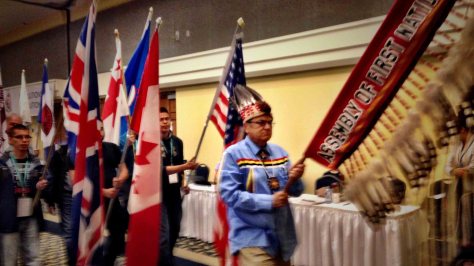
THE ASSEMBLY of First Nations 35th Annual General Assembly, held last week in Halifax, was remarkable more for what wasn’t said than what was. The name of the former national chief was seldom spoken, and the consensus appeared to be for a reconstitution of the leadership as quickly as possible, better to put behind the recent—and unprecedented—disruption.
I recall one speaker who, during debate of a motion to hold a December election, asserted that Atleo’s departure constituted a wound in need of healing. Judging from what followed (the motion passed), this was a minority view. Never mind the fractures and the emergence of rival camps and the grassroots calls for reform: having dogged a bullet, the appetite at the AFN was for getting back to business as usual.
And make no mistake: a bullet was indeed dodged. Or it may be, to use a different metaphor, that having absorbed the political blow-back of the federal education bill, former National Chief Atleo has made it possible for the remaining AFN chiefs to distance themselves from a controversial initiative. The FNCFNEA (First Nations Control of First Nations Education Act) is now the AFN’s region of fire and dragons, and whatever the map forward, the trajectory will avoid any possible collision with another Bill C-33.
This AGA reminded me—not that I’d forgotten—just how conservative an institution the AFN is. Something unspecific and skeletal called “reform” was in the room, but I tried without success to find someone who would put meat on it. Between a good many of the sentences were the financial problems of the Assembly of First Nations, which came into Halifax with a deficit nearing (if I recall this correctly) one million dollars. A leaderless AFN is a fiscal hazard, and so above all imperatives is the necessity of unplugging the money tap so far as that’s possible.
The December election will be hosted in Winnipeg by the Manitoba Keewatinowi Okimakanak, or MKO—whose Grand Chief by a nice irony is named Harper. I kept hearing MKO’s senior people employ the phrase “we’re ready to host today,” and so of course the Hamlet principle of protesting a bit too much came to my mind. Sure enough, even as David Harper was presenting at the podium, APTN’s invaluable journalist Jorge Barrera was tweeting MKO’s dismal finances and the Grand Chief’s penchant for spending public funds on his induglences, as well as on his Christian revivalism and other such Chautauqua nonsense. There’s now an effort underway within the MKO to unseat this ridiculous, corrupt and selfish (to say nothing of self-righteous) so-called leader.
Let’s never forget that the chiefs are politicians, and esteem them accordingly. I reserve for them the skepticism for all aspirants to office, whether red or white or any other hue. And I have to wonder why anyone of sound mind would even want the job, thankless as it is.
Before I’d got to the meeting, I chanced upon Chiefs Joe Alphonse and Roger William of the famed Tsilhqot’in case. We chatted briefly on a Halifax street corner about the recent Supreme Court ruling which awarded aboriginal title over a chunk of land within British Columbia. Behind this is a decades-long battle over the meaning of Section 35, in the constitution of Canada. Widely considered a “game changer,” the Tsilhqot’in case William v. British Columbia is now an occasion for First Nations people to claim a Section 35 victory. So it is. But while I was in Halifax I interviewed the man who was the National Chief of the AFN when this now much-cited touchstone, Section 35, came into being. His name is Del Riley. You’d think he’d be welcomed with open arms, but it ain’t quite like that. I’ve been to fifteen consecutive AFN meetings, and this was this first I’d seen of him. I told him as much. He then reminded me that the AFN ostracized him for his efforts, just as they surely would have done to Shawn Atleo had he not resigned. Section 35 was regarded, back in those days, as a failure, if not a betrayal.
To say that the job of National Chief is thankless is to understate things.
Follow me on Twitter

Please sign up to receive updates, newsletters, special book deals and my unyielding gratitude.

